Érica Tavares, advisor at EcoAngola, referred to the high concentration of algae of the species 'Noctiluca scintillans', which has been affecting the coastline of the province of Luanda for at least three months.
Faced with the situation, the Government created a multisectoral group that includes representatives from different institutions, to guarantee an integrated and effective approach to identify the origin of the fluid and implement necessary measures to mitigate the impacts, with samples being collected for analysis, the results of which are still wait.
“What we have to do at this moment is not to create commissions, but work teams. We have the National Institute of Environmental Management, we have the Ministry of the Environment, the Ministry of Fisheries, create teams that carry out analyses, that monitor and that can issue alerts that we have very high nutrients, that this will probably happen, because you can project , prevent this and alert the population”, said Érica Tavares.
EcoAngola and Guardians of the Mwangolé Coast, two Angolan environmental defense organizations, released, on Tuesday, the preliminary results of an investigation, which points to an increase in algae of the species 'Noctiluca scintillans', known for causing bioluminescent blooms and deterioration water quality when it grows excessively.
According to Érica Tavares, the report of what was happening arrived in August and on September 6th a letter was sent to the authorities informing them, with photographs and reports from fishermen and local residents about what was happening and requesting that the Government carry out an investigation.
“No direct response was received, we only saw the statement shared by Whattsapp groups”, said Érica Tavares, stressing that “more information was published to attract attention”.
“We cannot expect those who make mistakes to monitor themselves, so civil society organizations need to organize, they need to carry out independent studies and we need to do this so that the Government can do better”, he stressed.
“We await the results of the multisectoral commission and we will then compare results and see how we can contribute to preventing this from happening again”, he added.
According to the environmentalist, algae are seasonal and the phenomenon has happened every year, with the difference that this year the intensity is greater, because more and more wastewater ends up in the sea, without treatment, making it bigger. use of chemicals in agriculture.
“The more chemicals - which we call nutrients for organisms - increase, the more these algae will proliferate. If we don't start having laws, monitoring, accountability and simply continuing to maintain the way we are managing our wastewater, among others, in the coming years this will get worse”, he said.
The EcoAngola advisor expressed concern about reports from fishermen, who report that the dead fish that came to the coast was commercialized, considering that this is a public health issue.







